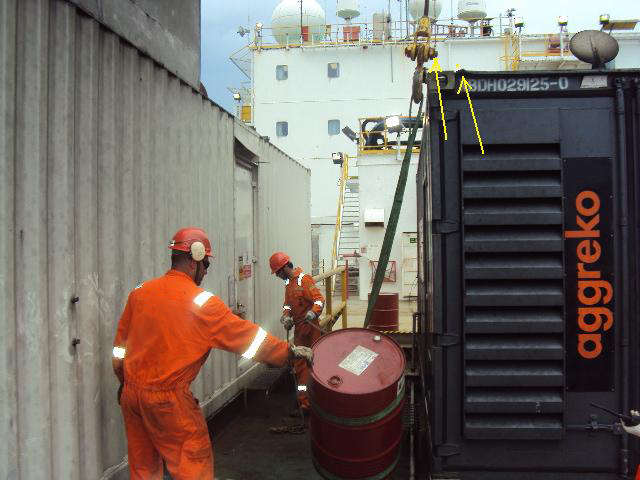Lack of safety awareness: crush injury during lifting operations
A member has reported an incident in which a crewman suffered minor crush injuries when his hand was caught between two objects during lifting operations. The incident occurred when some oil drums were being positioned on the deck using the crane, with the assistance of two deck crew. One was handling the tag line while the other was acting as the lift supervisor and was equipped with a radio to communicate with the crane operator. While manoeuvring the drums between a deck cargo of containers, the two deck crew attempted to man-handle the drums 1.5 meters horizontally without slewing the crane jib. The acting lift supervisor was pushing on the drum while the other pulled on the tag line. The acting lift supervisor radioed the crane operator and asked him to hoist a little; he was unaware at the time that the hoist wire was snagged on the container; this caused the drum to pinch the acting lift supervisor’s hand between the drum and container. He sustained a minor crush injury and was sent ashore for x-rays.


The member’s investigation noted the following:
- Existing company procedures were not followed;
- Risk assessments had not been completed;
- The individuals involved in the operation demonstrated a lack of safety awareness that put themselves, their colleagues and their vessel at risk;
- The individuals involved in the operation had received no training in this specific task.
The following lessons were learnt from the incident:
- Complacency with regard to any lifting operation, however small, must be guarded against;
- All persons involved in a task, from deck officers and supervisors to deck crew, should have a clear understanding of the nature of the task and their duties with regard to the task;
- All crew should have a deeper understanding of the requirement for risk assessment for all ‘routine’ and non-‘routine’ tasks;
- All crew members should be reminded of the importance of accepting personal responsibility for safety and that they all are empowered to stop work until safe operations are restored;
- Shipboard training and familiarisation should include specific training in particular tasks and equipment.
Safety Event
Published: 29 June 2011
Download: IMCA SF 05/11
IMCA Safety Flashes
Submit a Report
IMCA Safety Flashes summarise key safety matters and incidents, allowing lessons to be more easily learnt for the benefit of all. The effectiveness of the IMCA Safety Flash system depends on Members sharing information and so avoiding repeat incidents. Please consider adding safetyreports@imca-int.com to your internal distribution list for safety alerts or manually submitting information on incidents you consider may be relevant. All information is anonymised or sanitised, as appropriate.
IMCA’s store terms and conditions (https://www.imca-int.com/legal-notices/terms/) apply to all downloads from IMCA’s website, including this document.
IMCA makes every effort to ensure the accuracy and reliability of the data contained in the documents it publishes, but IMCA shall not be liable for any guidance and/or recommendation and/or statement herein contained. The information contained in this document does not fulfil or replace any individual’s or Member's legal, regulatory or other duties or obligations in respect of their operations. Individuals and Members remain solely responsible for the safe, lawful and proper conduct of their operations.
